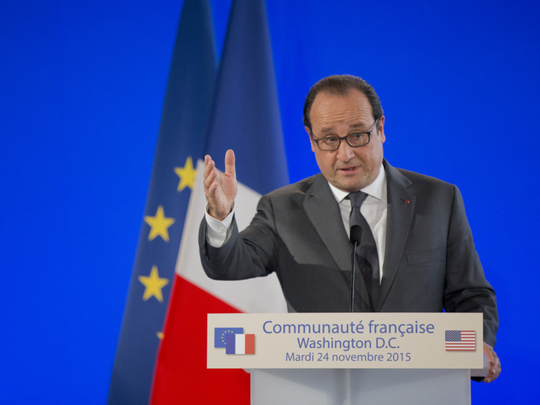
In calling for a war against Daesh (the self-proclaimed Islamic State of Iraq and the Levant), French President Francois Hollande is engaging in a tragically counterproductive enterprise. Under international law, “war” can only exist between sovereign states. Hollande is rashly giving Daesh precisely what it wants: legal recognition.
Such a move would not only represent a profound defeat for the West in the war of ideas; it would also have immediate practical consequences. If the French succeed in capturing terrorists, must they treat them as prisoners of war, entitled to all the rights guaranteed by the Geneva Convention?
This is precisely the question the US has confronted at Guantanamo. To avoid the Geneva Convention, the Bush administration called its internees “unlawful combatants” since they were not fighting in military uniforms. Will France create a similar “no-law zone” when dealing with terrorists, and act lawlessly while denouncing Daesh for its lawlessness?
History has its ironies, yet this one is too terrible to contemplate. Recall that French President Jacques Chirac refused to enlist in the worldwide “war on terror” at the time of the Iraq invasion. By standing aside, he saved France from complicity with the torture and lawlessness that have damaged the international reputations of the United States and Britain. But, rather than following in Chirac’s footsteps, Hollande is now endorsing indiscriminate war talk at a time when President Barack Obama and British Prime Minister David Cameron have been cautiously extricating themselves from the legacy left by George W. Bush and Tony Blair.
Worse yet, it is all too likely that the West will lose the “war” that Hollande seems to want. After military defeats in Afghanistan and Iraq, the US and British publics will not support another massive ground invasion in the Middle East. Despite the bellicosity of some GOP candidates, there is broad support for Obama’s recent statement making it clear that no such invasion is in the offing.
War is not winnable without Western ground troops. After all, the Obama administration has already tried and failed to fill the gap by funding the development of powerful moderate Arab ground forces. Last month, it abandoned its half-billion-dollar initiative after finding that it had created only a handful of combat-ready troops while allowing Daesh to obtain advanced American weapons through corrupt deals with “moderate” leaders.
Hollande’s war talk, besides, is entirely unnecessary for decisive action. The French Constitution authorises the president to exercise extraordinary powers whenever the country’s institutions are under “grave and immediate threat,” including sweeping preventive detention measures. Hollande is proposing a formal amendment to make it easier to invoke this provision. And in the meantime, he has persuaded the legislature to pass a statute granting him interim powers.
Rather than lashing out abroad, it makes far more sense to crack down domestically.
Wars are open-ended; once they start, it’s difficult for citizens to control their government’s actions. In contrast, the French Constitution’s grant of emergency powers is more limited, lasting only 60 days. At that point, the president must convince the country’s Constitutional Council that the threat continues to be “imminent”. Even if he succeeds, the council is under a continuing obligation to rein in the president “at any moment” if it determines that the risk has returned to more normal levels.
These sunset clauses allow France to make a vital distinction between immediate and long-term responses to terrorist tragedies. In the near term, drastic measures — short of torture — may well be reasonable to disrupt networks that have successfully eluded the security services. In the longer term, sunset clauses help prevent these emergency measures from developing an institutional momentum of their own.
Without them, security services may feel emboldened to transform a state of emergency into the “new normal.” They may demand even harsher measures when the “new normal” fails to prevent another terrorist attack.
Safeguards must be preserved when parliament turns to consider Hollande’s plan to amend the Constitution. Parliament should insist on strong sunset clauses that will guarantee the survival of France’s great tradition of civil liberty. It should not allow the prevailing panic to create a system that threatens, over time, to destroy the basic freedoms that distinguish the West from its ideological competitors.
— Los Angeles Times
Bruce Ackerman is a professor of Law and Political Science at Yale and the author of Before the First Attack.








